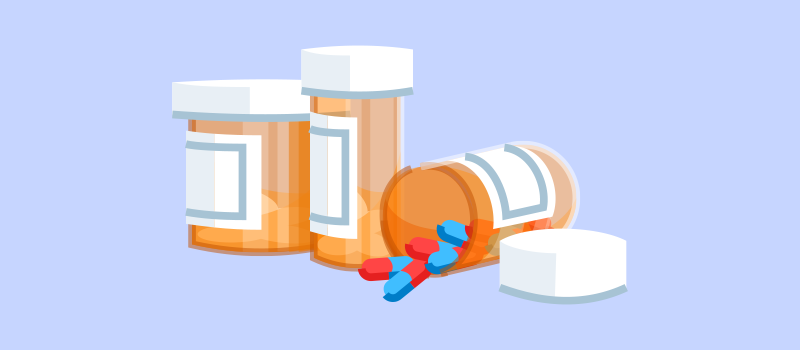What’s the Buzz
The Bee Healthy Blog
ADHD Medications: Adderall vs. Vyvanse

Attention deficit hyperactivity disorder (ADHD) is a condition in which an affected person has difficulty focusing, remaining still, and controlling their actions. The Centers for Disease Control and Prevention (CDC) estimates that 6 million children in the United States (nearly 10%) have attention deficit hyperactivity disorder (ADHD). State-wise estimates range from 6 to 16% per state.
Medications are available for the treatment of ADHD along with behavioral therapy. These treatments can lead to a significant improvement in the core symptoms of attention deficit hyperactivity disorder.
Today, we will compare two FDA-approved central nervous system stimulants—Adderall and Vyvanse. These stimulant medications are commonly prescribed to people with ADHD symptoms.
What is Adderall?
Adderall is the brand name for a combination of generic medications called dextroamphetamine and amphetamine. This medicine is used to treat attention deficit hyperactivity disorder in children 3 years of age and older.
Adderall is the immediate-release form of the drug. Other brand names for the dextroamphetamine and amphetamine combination are Adderall XR and Mydayis, which are extended-release capsules. Adderall XR is for adults and children 6 years of age and older. Mydayis is prescribed for adult ADHD to people 13 years of age and older.
Adderall immediate release is taken 2-3 times a day, with or without food. The extended-release capsules (Adderall XR and Mydayis) are taken once a day in the morning, with or without food.
Common side effects of Adderall include headache, dry mouth, nervousness, painful menstrual cramps, nausea, diarrhea, constipation, decreased appetite, and weight loss.
What is Vyvanse?
Vyvanse (Vyvanse coupon) is the brand name for the generic medication lisdexamfetamine dimesylate. It is used to treat ADHD in children 6 years of age and older. This medicine comes in the form of lisdexamfetamine capsules and chewable tablets. It is taken once a day by mouth in the morning, with or without food.
Common side effects of Vyvanse capsules include drowsiness, dry mouth, dizziness, headache, nausea, diarrhea, constipation, decreased appetite, and weight loss.
What is the difference between Adderall and Vyvanse?
Both Adderall and Vyvanse are used to treat attention deficit hyperactivity disorder (ADHD) and are effective forms of stimulant therapy. Each of these drugs is a prescription medication and a Schedule II federally controlled substance with a potential for abuse, especially in people with a history of substance abuse (drug or alcohol abuse).
However, despite their similarities, there are some key differences between Adderall and Vyvanse. Understanding these differences can help you and your healthcare provider choose the best stimulant medication for yourself or your child. You should also talk to your doctor about other stimulant medications before making a decision.
Uses
Both Adderall and Vyvanse are used to treat attention deficit hyperactivity disorder in adults and children. Additionally, Adderall is also used to treat a sleep disorder called narcolepsy, which is characterized by excessive drowsiness and sudden attacks of falling asleep. Vyvanse is also used to treat binge eating disorder in adults.
Keep in mind that these and other drugs categorized as stimulants can lead to increased blood pressure and heart rate. Discuss with your provider if you have a history of chest pain, heart disease, heart attack, blood flow problems, or kidney disease.
Age Range
Adderall immediate release is approved for use in children 3 years of age and older. Vyvanse is approved for use in children 6 years of age and older. Vyvanse comes as a chewable tablet and may be a more convenient form of oral administration in children.
Dosage Forms
Adderall comes in both immediate-release and extended-release forms. Vyvanse is only available in an extended-release form.
Duration of Action
Immediate-release Adderall has a duration of action of 4-6 hours and needs to be taken 2-3 times a day. Vyvanse is an extended-release capsule with a duration of action of 10-14 hours, so it only needs to be taken once a day.
Side Effects
Vyvanse is generally better tolerated than Adderall and tends to cause fewer severe side effects.
Drug Interactions
Both Adderall and Vyvanse can have possible drug interactions with other medications. For example, taking a monoamine oxidase inhibitor (MAOI) with these stimulant medications can have consequences. Therefore, the choice of stimulant medication (Adderall vs. Vyvanse) may depend on your other medications.
Be sure to tell your doctor about all the medications and nutritional supplements you take. Also, tell them if you use any street drugs. Your healthcare provider will prescribe Adderall vs. Vyvanse vs. other ADHD medications after taking into account any potential drug interaction with your other medications.
Potential for Drug Abuse
Both Adderall and Vyvanse can be habit-forming. However, Vyvanse has a lower potential for stimulant abuse compared to Adderall. This is because it takes longer for the body to metabolize Vyvanse. Also, Vyvanse is a pro-drug that is converted into an active metabolite by enzymes in the body. Therefore, it can only be taken orally. On the other hand, Adderall has different mediums of administration.
Frequently Asked Questions
What is the closest drug to Vyvanse?
Concerta (methylphenidate) belongs to the same family of drugs as Vyvanse (lisdexamfetamine). Your healthcare provider can help you choose between Vyvanse vs. Concerta or some other stimulant medication.
Is dextroamphetamine the same as Adderall?
Dextroamphetamine and Adderall are not the same. Adderall contains a mixture of two salts—dextroamphetamine and amphetamine. Dextroamphetamine is available under the brand name Dexedrine.
What does Vyvanse do to you?
Vyvanse and other stimulants increase the levels of neurotransmitters called norepinephrine and dopamine in the brain. This leads to an increase in attention span and makes it easier for people with ADHD to focus and remain still.
How does Vyvanse make you feel?
Vyvanse makes you feel more alert and focused. Some people misuse stimulant medications. However, stimulant abuse can lead to serious health consequences, including withdrawal symptoms and sudden death.
Is Vyvanse good for anxiety?
Vyvanse is not an anti-anxiety medication. However, it may relieve symptoms of anxiety by providing relief from ADHD symptoms. If you have a mental illness such as anxiety, depression, or bipolar disorder (alternating depressive and manic symptoms), talk to your mental health professional about other drugs. There are more effective treatments available for these conditions.
References:











SOCIAL